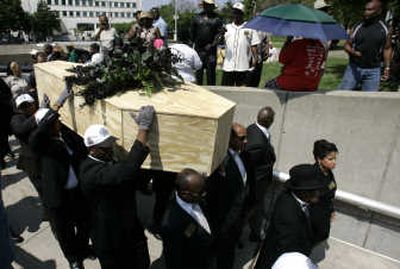NAACP holds funeral for racial slur

DETROIT – There was no mourning at this funeral.
Hundreds of onlookers cheered Monday afternoon as the NAACP put to rest a long-standing expression of racism by holding a public burial for the N-word during its annual convention.
Delegates from across the country marched from downtown Detroit’s Cobo Center to Hart Plaza. Two Percheron horses pulled a pine box adorned with a bouquet of fake black roses and a black ribbon printed with a derivation of the word.
The coffin is to be placed at historically black Detroit Memorial Park Cemetery and will have a headstone.
“Today we’re not just burying the N-word; we’re taking it out of our spirit,” said Detroit Mayor Kwame Kilpatrick.
The word has been used as a slur against blacks for more than a century. It remains a symbol of racism, but also is used by blacks when referring to other blacks, especially in comedy routines and rap and hip-hop music.
“This was the greatest child that racism ever birthed,” the Rev. Otis Moss III, assistant pastor at Trinity United Church of Christ in Chicago, said in his eulogy.
Public discussion on the word’s use increased last year following a tirade by “Seinfeld” actor Michael Richards, who used it repeatedly during a Los Angeles comedy routine and later issued a public apology.
The issue of racially insensitive remarks heated up earlier this year after talk show host Don Imus described black members of the Rutgers University women’s basketball team as “nappy-headed hos” on April 4.
Black leaders, including the Revs. Jesse Jackson and Al Sharpton, have challenged the entertainment industry and the American public to stop using the word and other racial slurs.
Minister and rap icon Kurtis Blow called for people, especially young people, to stop buying music by artists who use offensive language.
“They wouldn’t make rap songs if you didn’t buy them. Stop supporting the stuff you don’t want to hear,” said Blow, who is credited with helping create the genre’s popularity in the late 1970s and early 1980s.
The Rev. Wendell Anthony, pastor of Detroit’s Fellowship Chapel and member of the NAACP national board of directors, said the efforts were not an attack on young people or hip-hop.
He said they were a commentary on the culture the genre has produced.
“We’re not thugs. We’re not gangstas,” Anthony told the crowd. “All of us has been guilty of this word. It’s upon all of us to now kill this word.”